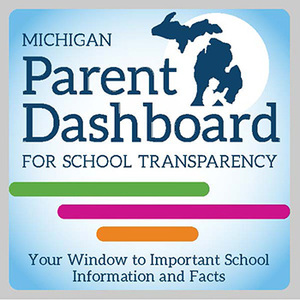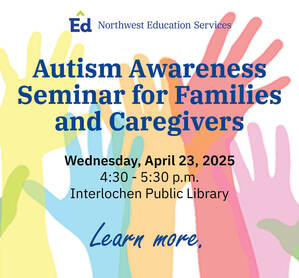New Horizons
Programs for Students with Cognitive Impairments
Moderate Cognitive Impairments (MoCI) Programs:
Northwest Education Services operates specialized programs to meet the needs of students with moderate cognitive impairments. These programs are designed to strengthen the academic, communication, social, and daily living skills of students. The primary goal of these programs is skill acquisition. These skills range from the traditional academic skills of reading, writing, and math to the transition skills of pre-vocational training and participation in community experiences. Classes are located in various Traverse City Area Public Schools for students in kindergarten through 12th grade. Typically, students move to the Transition Campus after age 18.
Severe Cognitive Impairment (SCI)
or Severe Multiple Impairment (SXI) Programs:
Northwest Education Services provides specialized programs for students with severe cognitive impairments as well as students with severe multiple impairments. These programs help students become as independent and productive as possible. Student goals center on daily living skills, communication, motor skills, appropriate social behaviors, leisure skills, and prevocational and vocational skills. Collaboration between teachers, parents and staff assists every student to reach his or her full potential.
![]() Annual Education Report - New Horizons (Posted 2/13/2025)
Annual Education Report - New Horizons (Posted 2/13/2025)
Overview of Program
Moderately Cognitive Impaired (MOCI) Programs
Students in this program typically have moderate cognitive impairments with cognitive scores that range from 35 to 55 and significant delays in adaptive skills.
Location: Two classrooms at Courtade Elementary, one at East Middle School, and two at Central High School. All schools are part of TCAPS.
Grade Levels: K-12th
Class Size: Typically under 13 students (can have up to 30 according to Special Education rules). Younger classrooms typically have fewer students.
Staffing: One teacher with CI endorsement and two teacher assistants (occasionally will have more if there is a student need).
Focus: All students in the MOCI Program are on a modified curriculum aligned to the Essential Elements. The program includes extensive universal supports for accessing the curriculum including increased wait time, presenting instruction through multiple modalities, providing alternative methods for demonstrating understanding, access to assistive technology, much repetition, and a slower pace to instruction. There is a heavy emphasis on expanding communication skills, social skills and overall independence.
Curriculum:
- Math: We use Number Worlds Curriculum to assist students in making progress through the Math Trajectories.
- Language Arts: The MOCI program utilizes different curriculum materials to meet the needs of diverse learners.
- Social Emotional Learning: Our elementary students get explicit instruction in social skills through TeachTown. Our middle and high school students practice important social skills in expanded settings through community-based instruction and prevocational activities. Teachers continue with explicit instruction of social skills using a variety of curricula including Attainment's Explore Social Skills, Unique Learning System's Transition Band, and the Circles Curriculum. All of our students learn about their feelings and self regulation through the Zones of Regulation program.
- Life Skills: In the younger grades, life skills instruction focuses on following school routines, toilet training, completing self care tasks like washing hands and handling clothing. As students get older, they start to work on applying what they have learned in the school setting out in the community through community based instruction. This may include working on functional math skills, reading skills, social skills, and communication in community settings like the grocery store, library, or a restaurant. Middle school students start to work on prevocational skills by doing some work tasks in the school setting. Our older high school students start attending Work Skills at the North Ed Life Skills Center to further their development of vocational skills.
- Communication: Many students within the MOCI program use Augmentative and Alternative Communication (AAC) for communication. Typically, students using AAC have a device with a voice-output app. However, some students use lower-tech options for communication. Students who communicate verbally are usually working on expanding their use of language and their social communication skills. Teachers model communication using core boards and students' communication systems throughout the day.
- Access to General Education Peers: Students within MOCI programs stay with their classmates throughout the day. They do not attend general education classes. At the different levels, students do participate in some activities with general education peers, including attending assemblies, having class buddies, or participating in peer-to-peer programs.
Severely Multiply Impaired (SXI) Programs
Students in this program typically have cognitive impairments that fall within the severe range and complex communication needs. They also have other impairments such as physical impairments, health impairments, or vision or hearing impairments that affect their access to the curriculum and require intense supports.
Location: Four classrooms at New Horizons School, one classroom is an ECSE program for preschoolers with severe multiple impairments, 3 classrooms are for students with severe multiple impairments who are beyond preschool age.
Grade Levels: Preschool through age 16 (students may move on to the SCI program at Bridgeway or the high school SXI classroom at Life Skills Center when they age out of New Horizons).
Class Size: No more than 9 students for SXI programs. ECSE program can have up to 12 students within each session.
Staffing: One teacher with CI endorsement and two teacher assistants (occasionally will have more if there is a student need)
Focus: SXI Programs include extensive modification to the curriculum aligned to the Essential Elements. There is a heavy focus on establishing functional communication through the use of Augmentative and Alternative Communication and working on functional mobility. Therapists are heavily involved in the classroom to meet the diverse needs of students.
Curriculum:
- Math: We use a modified version of the Math Trajectories, Equals Math, and the work of Les Staves.
- Language Arts: SXI program ELA instruction focuses on 4Blocks for Emergent Readers
- Social Emotional Learning: Students learn about their feelings and self regulation through the Zones of Regulation program.
- Functional Mobility: Staff are trained in Mobility Opportunities Via Education (MOVE) and our therapists have been trained in Mobility for Communication. We view every activity in the day as an opportunity to work on functional mobility and communication skills. Our students have access to a broad range of mobility and positioning equipment.
- Communication: All students within the SXI program have complex communication needs. It is our goal to provide each student a method of functional communication, typically through the use of Augmentative and Alternative Communication (AAC). Our speech therapist works closely with our Assistive Technology department to provide students access to communication tools. Teachers model communication using core boards and students' communication systems throughout the day.
- Access to General Education Peers: Students within SXI programs stay with their classmates throughout the day. They do not attend general education classes. Students do participate in some activities with general education peers, including attending assemblies, having class buddies, or participating in peer-to-peer programs.
Food Services: All North Ed special education program students will have access to free breakfast and lunch each school day. Visit our Food Services webpage to learn more.



